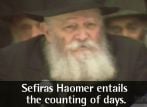Question:
I enjoy counting the Omer very much, because I relate to the self-improvement/awareness that it brings me each day. So, it’s disappointing when I miss a day . . . very much so. Missing one (or several) makes me feel incomplete. Besides the fact that I can no longer count with a blessing.
Is there something specific I can do to make up for missed Omer counting days? Or is there some other exercise with a similar effect as counting the Omer?
Response:
Each day of the Omer count provides a unique opportunity that no other day can provide: A chance to clean up another part of the soul, to be prepared for the giving of the Torah on Shavuot. Counting that day is a major part of that cleansing process.
You're looking for some way to travel back in time and do it right. Basically, a time machine.
Well, a time machine exists, and it’s called “do it right from now on” (a.k.a. teshuvah). It’s not so hard to operate: You just make a strong resolution that those mistakes will never happen again. That resolve reaches back in time and heals the omissions of the past.
There’s a caveat, however: “I’ll try better from now on” does not cut it for a strong resolution. You'll need to find something more substantial that will pretty much guarantee no messups from now on.
One helpful means is to download our Omer Counter app. Besides sending you reminders, it has many additional features, such as a daily sefira meditation.
But, truthfully, don't rely on it. If you're like the rest of us, you're getting so many notifications, they've become background noise.
Being another of those forgetful, absent-minded types, I’ve found over the years that there is really only one solution to never forgetting the Omer: to count with a minyan every night. What I’m suggesting, therefore, is that you take upon yourself to pray with a minyan every night until Shavuot. That will ensure you don’t mess up from now on. And besides, you will be able to hear the blessing from the leader of the prayers, who has everyone in mind when he says that blessing. Resolve, as well, to do the same next year, if possible.
(When making this resolution—or any resolution, for that matter—make sure to say that you are doing this “without any vow.” In Hebrew, that’s “bli neder.” That’s important, since breaking a vow is very serious business in Torah terms.)
If there’s no minyan within a reasonable distance, you should at least find out what time the closest minyan convenes and always pray at that time. This solution is presented in Shulchan Aruch, Orach Chayim 90:9: “One who is incapable of coming to the synagogue should aim to pray at the time when the congregation prays.” Rabbi Moshe Isserles adds in his gloss that this also applies to those who live in places where there is no minyan.
Try this out. And let me wish you the traditional blessing of “May you receive the Torah this year with joy and in an inner way!”







Join the Discussion